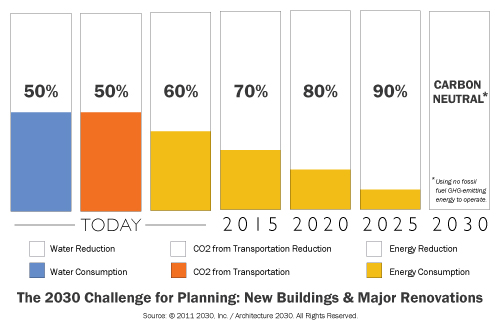 |
| Downtown Pittsburgh, Pennsylvania and the Duquesne Incline (foreground) as seen from nearby Mt. Washington. Photo: David Owen/ Artifice Images |
The Pittsburgh 2030 District currently includes 61 properties and more than 23 million square feet (over 7 million square meters) of the city's downtown area. Pittsburgh joins Seattle, Washington and Cleveland, Ohio, which have already established 2030 Districts.
 |
| Graph of proposed reductions to energy, water, and carbon dioxide from transportation, for existing developments under the 2030 Challenge for Planning. Image: © Architecture 2030 |
The challenge identifies different target reductions, depending on whether a project is new or existing. For existing developments in these urban areas, the plan calls for an immediate 10% reduction -- compared with the regional average -- in each of those three categories, stepping down to a 50% overall reduction by 2030.
Likewise, the 2030 Challenge for Planning calls for carbon neutrality in all new and renovated developments within the designated districts by 2030, with a 60% beginning reduction from the regional average, with additional targets to meet every 5 years, starting in 2015.
 |
| Graph of proposed reductions for new developments under the 2030 Challenge for Planning. Image: © Architecture 2030 |
No comments:
Post a Comment